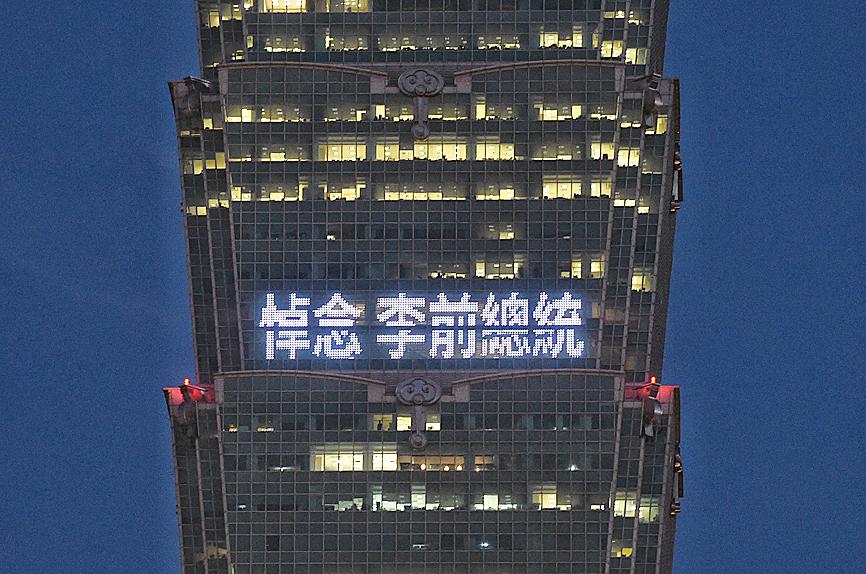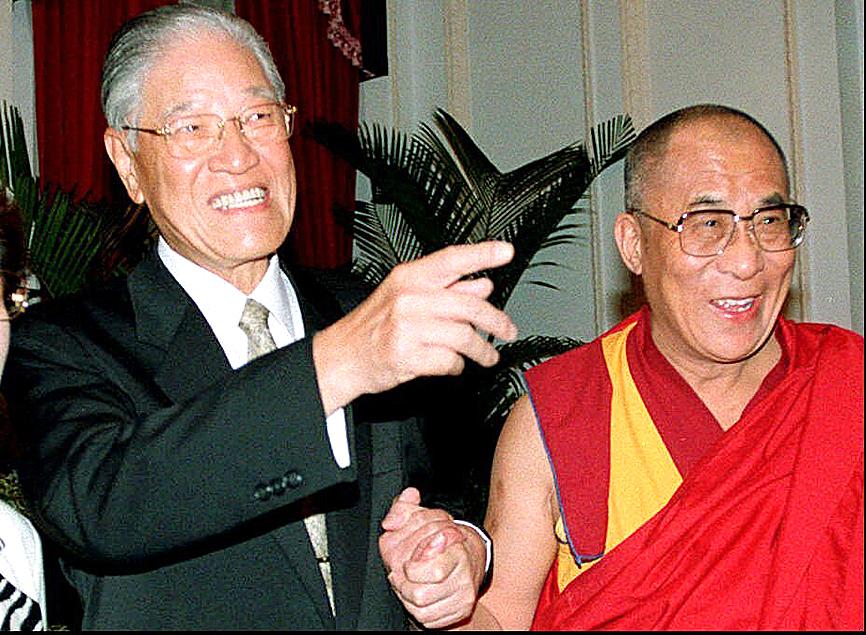The White House in a statement on Friday marked the passing of former president Lee Teng-hui (李登輝), while Lee’s alma mater Cornell University issued an obituary remembering his academic achievements and his 1995 speech during a visit to the campus.
It followed a statement by US Secretary of State Mike Pompeo marking Lee’s contributions to Taiwan’s democratization.
Lee died due to septic shock and multiple organ failure in Taipei on Thursday evening. He was 97.

Photo: Fang Pin-chao, Taipei Times
The White House statement said that “President Lee was Taiwan’s first popularly elected leader and stepped down in adherence to term limits. President Lee was the architect of Taiwan’s modern democratic system, which today serves as a shining example of citizen-centric governance for the region and the world.”
“He led Taiwan through its transition from authoritarian military rule to a prosperous, free and open society. He will always be remembered for his strong commitment to democratic principles and human dignity,” it said.
The White House statement came after the US National Security Council remembered Lee as “Mr Democracy.”

Photo: AP / Yeh Tao-chuan
“We offer our deepest condolences to the people of Taiwan and the loved ones of former President Lee Teng-hui, the first popularly elected leader of Taiwan. ‘Mr. Democracy’ was a champion for freedom and the architect of Taiwan’s free and open society,” it said.
Cornell University, where Lee earned a doctorate in agricultural economics in 1968, published an obituary on its Web site.
Lee’s dissertation, titled “Intersectoral Capital Flows in the Economic Development of Taiwan, 1895-1960,” was selected as the outstanding dissertation of 1968 by the American Agricultural Association and later published as a book by the Cornel University Press, the school said.
Cornell also noted Lee’s speech at the Cornell Reunion on June 9, 1995, which he delivered in English.
Saying the visit “has been a long and challenging journey, with many bumps in the road,” Lee in his speech thanked the US Congress and people for their support, and then-US president Bill Clinton for his “statesman-like decision” that made his visit possible.
Clinton had refused Lee’s request for a visa in 1994.
Throughout his speech, Lee referred to Taiwan as “the Republic of China on Taiwan,” while touting “the Taiwan experience” of peaceful political change from authoritarianism to democracy.
Several hundred reporters from around the world covered Lee’s visit, and the lecture was broadcast throughout Asia and around the world, Cornell said.
Following Lee’s visit to the US, China launched missiles into the waters near Taiwan and the US responded by sending two aircraft carrier battle groups to the region, which later became known as the Third Taiwan Strait Crisis of July 1995 to March 1996.
Chen Jian (陳兼), professor emeritus of history and China-US relations at Cornell, said in the school's statement that “Lee will be remembered as a leader who played a significant role in Taiwan’s transition toward democratization and who also shaped the trajectory of Taiwan’s increasing separation from mainland China” and that "history will judge."
Separately on Friday, the Dalai Lama conveyed his condolences to Lee’s family via a letter delivered by the Dalai Lama’s office, saying that he had considered Lee a “personal friend” since his first visit to Taiwan in 1997.
That Taiwan enjoys such vibrancy, prosperity and rich cultural heritage as a democratic nation owes much to Lee’s contributions to the democratization of Taiwan, the Dalai Lama said.
Remembering Lee’s courage and resolve, and emulating his devotion to democracy is the best way to respect him, the Dalai Lama said.
Exiled Tibetan President Lobsang Sangay said that Lee’s meeting with the Dalai Lama marked the beginning of a new chapter in the Taiwan-Tibetan friendship.
Additional reporting by Chung Li-hua

US President Donald Trump yesterday announced sweeping "reciprocal tariffs" on US trading partners, including a 32 percent tax on goods from Taiwan that is set to take effect on Wednesday. At a Rose Garden event, Trump declared a 10 percent baseline tax on imports from all countries, with the White House saying it would take effect on Saturday. Countries with larger trade surpluses with the US would face higher duties beginning on Wednesday, including Taiwan (32 percent), China (34 percent), Japan (24 percent), South Korea (25 percent), Vietnam (46 percent) and Thailand (36 percent). Canada and Mexico, the two largest US trading

AIR SUPPORT: The Ministry of National Defense thanked the US for the delivery, adding that it was an indicator of the White House’s commitment to the Taiwan Relations Act Deputy Minister of National Defense Po Horng-huei (柏鴻輝) and Representative to the US Alexander Yui on Friday attended a delivery ceremony for the first of Taiwan’s long-awaited 66 F-16C/D Block 70 jets at a Lockheed Martin Corp factory in Greenville, South Carolina. “We are so proud to be the global home of the F-16 and to support Taiwan’s air defense capabilities,” US Representative William Timmons wrote on X, alongside a photograph of Taiwanese and US officials at the event. The F-16C/D Block 70 jets Taiwan ordered have the same capabilities as aircraft that had been upgraded to F-16Vs. The batch of Lockheed Martin

GRIDLOCK: The National Fire Agency’s Special Search and Rescue team is on standby to travel to the countries to help out with the rescue effort A powerful earthquake rocked Myanmar and neighboring Thailand yesterday, killing at least three people in Bangkok and burying dozens when a high-rise building under construction collapsed. Footage shared on social media from Myanmar’s second-largest city showed widespread destruction, raising fears that many were trapped under the rubble or killed. The magnitude 7.7 earthquake, with an epicenter near Mandalay in Myanmar, struck at midday and was followed by a strong magnitude 6.4 aftershock. The extent of death, injury and destruction — especially in Myanmar, which is embroiled in a civil war and where information is tightly controlled at the best of times —

China's military today said it began joint army, navy and rocket force exercises around Taiwan to "serve as a stern warning and powerful deterrent against Taiwanese independence," calling President William Lai (賴清德) a "parasite." The exercises come after Lai called Beijing a "foreign hostile force" last month. More than 10 Chinese military ships approached close to Taiwan's 24 nautical mile (44.4km) contiguous zone this morning and Taiwan sent its own warships to respond, two senior Taiwanese officials said. Taiwan has not yet detected any live fire by the Chinese military so far, one of the officials said. The drills took place after US Secretary